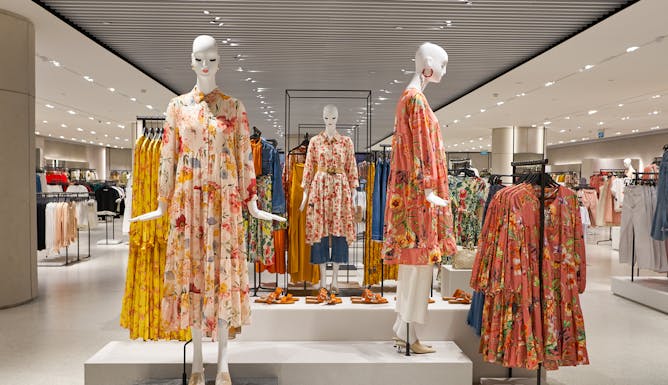|
|
|
Libraries have innovated, but it’s still the books that matter
|
|
Today in The Conversation Canada, Paulette Rothbauer, from Western University, writes about how reading and books help us develop our capacity for empathy, critical thinking and reflection, and may even lead to a longer life. The public library, she points out, is central to nurturing reading and connecting readers to new books and ideas. Public libraries may have fishing rods, musical instruments and radon detectors to borrow, but let’s not forget that they also have books!
We also look at the business of fast-fashion and whether it’s compatible with a climate crisis. Large brands are introducing recycling and sustainable fabrics to their lines, but the fashion industry still lays claim to eight per cent of global greenhouse gas emissions. Will they really change their ways?
Have you noticed how pharmacies have changed over the decades? Pharmacists aren’t only dispensing medications, they’re also selling retail products like food and cosmetics. Some even provide vaccines or interpret lab results. Not only has it been good for the bottom line, it’s also been good for patients.
Finally, we take a look at voter turnout during elections. During the 2015 election, a little more than 68 per cent of eligible voters cast a vote. That’s an improvement over recent years, but nowhere near the participation seen in the 60s and 70s. Ofer Berenstein, from the University of Calgary, looks at how campaigns can engage the occasional voter.
|
Hannah Hoag
Environment + Energy Editor
|

|
|
Today's top stories
|

Reading and books are more important than ever for contemporary society. Here an image of The Rose Main Reading Room at the Stephen A. Schwarzman Building (also known as New York Public Library Main Branch) – an elegant study hall in the heart of Manhattan.
Patrick Robert Doyle /Unsplash
Paulette Rothbauer, Western University
Today's libraries build communities and provide space for learning new technologies but it is critical that they continue to be about books and reading too.
|

Zara says it will only use sustainable textiles in the future to do its part in the climate crisis. This image is from a Zara shop in Singapore, 2019.
Shutterstock
Anika Kozlowski, Ryerson University
Zara, a fast-fashion clothing company, recently pledged to produce its line using only sustainable textiles. But it is not enough to curb the company's significant impact on climate change.
|

Legislation that expands the types of services offered by pharmacies may also benefit their profits.
Shutterstock
Grant Alexander Wilson, University of Saskatchewan
Expanding the services offered by pharmacies can have positive effects on health outcomes — and profits.
|

Occasional voters don’t respond well to guilt trips when organizations try to encourage them to cast ballots. Research suggests other methods are more successful.
Unsplash
Ofer Berenstein, University of Calgary
Encouraging people to vote involves changing the discourse. Guilt trips are ineffective.
|
La Conversation Canada
|

Sam Telford, Tufts University
Les scientifiques savent que la bactérie à l'origine de la maladie de Lyme s'est répandue dans la nature bien avant que la recherche sur les armes biologiques n'ait pu s'y intéresser.
| |

Enrica Maria Ferrara, University College Dublin
Quelle est l'importance de l'identité d'un auteur ? Un romancier peut-il vraiment « devenir » quelqu'un d'autre ?
|
|
|
Environment + Energy
|
-
Colin A. Chapman, McGill University; Patrick Omeja, Makerere University
Given Africa’s projected population growth, management of its environment must be a global priority
|
|
Health + Medicine
|
-
Bill Sullivan, Indiana University
The brain-eating amoeba _Naegleria fowleri_ kills 97% of its victims, and infections are almost impossible to diagnose quickly. Here is how it kills.
|
|
Politics
|
-
Peter Walters, The University of Queensland; Naomi Smith, Federation University Australia
Hong Kong has few recognisable public places and none with the space for huge numbers of protesters. Instead, they have co-opted the streets and digital media as public spaces for protest.
|
|
Science + Technology
|
-
Santosh Vijaykumar, Northumbria University, Newcastle
New evidence suggests most YouTube videos on climate change deny its existence.
|
|
| |
| |
| |
| |
| |
| |
|
|
|
|
|
|
|